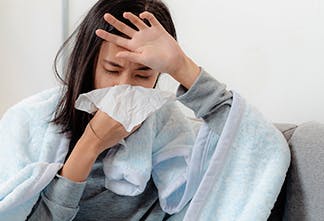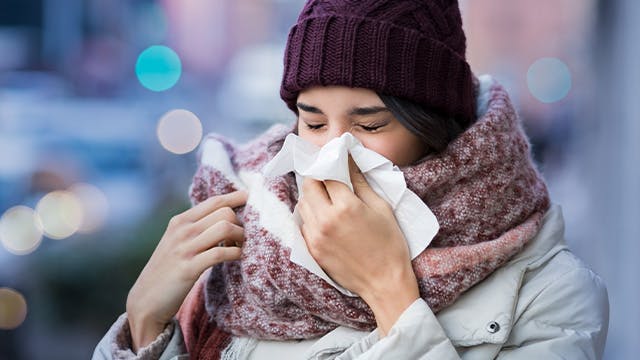The Causes of Frequent Colds in Adults
There are several reasons why adults might frequently get colds throughout the year. However, there are prevention methods that can help you lower your chances of getting a cold if you find yourself in one of the following circumstances:
You’re Overexposed to the Cold Virus
There are over 200 known viruses that can cause the common cold.3 So even if you’ve had a cold before, your immune system probably hasn’t built up defenses against every virus strain that can lead to a cold. Another reason could be that you’re around a lot of people who are sick. During peak cold & flu season, chances are you’re going to be exposed to more sick people in public places, such as work, school, public transit systems, and stores.
Your overexposure can also increase if you’re in close contact with children—like parents and teachers often are—because children haven’t fully developed an immune response to the viruses that cause a common cold, so they’re more likely to carry them and more likely to get sick.
Because of their less developed immune system, children are at higher risks for contracting more than 200 types of cold viruses.6 Outside of their immune system, your children interact with other children who have runny noses, who sneeze or cough without properly covering their mouths, and who might not know how to properly wash their hands.
Teaching your child how to properly wash their hands when they’re done playing with toys, blowing their nose, or spending time in a room with a lot of other people can help lower their risk of getting a cold. Cold viruses can remain on things like toys and furniture for hours.6 When your child goes to play with a toy or sit at a table, and they put their hands in their mouth, on their eyes, or in their nose, they have a higher chance of contracting a cold virus.
To help reduce frequent colds for you and your child, try practicing some basic hygiene principles more often—like washing your hands before touching your face, nose, or mouth—and avoiding people with cold symptoms.
You’re Exposed to Other Airborne Irritants
Most people’s immune systems can manage the common cold. However, if you’re someone who smokes cigarettes, is around second-hand smoke, or other environmental pollutants, your immune system may be overworked.4 In a recent study, researchers found that the cells that line our nasal airways are very capable of defending against the viruses that cause the common cold. But if those same cells are busy fighting off damage from cigarette smoke or other pollutants, their ability to stave off cold-causing viruses becomes weakened—leaving you more likely to catch a cold.
You Could Be Suffering From Allergies
If you’re coughing, sneezing, or dealing with a runny nose more frequently than others, especially during certain seasons, then your symptoms could be due to allergies.4 While colds are caused by viruses, allergies are triggered by exposure to indoor or outdoor allergens, like pollen, dust, mold, or pet dander. Once you’re exposed to an allergen, your immune system reacts to the substance as though it’s harmful, and creates a response that leads to symptoms that can be confused for a cold.
So, if you experience frequent or recurrent colds, talk to your doctor to see if it could be due to any of the reasons discussed above. And if you suffer from allergies, talk to them about treatment options and ways that can help reduce your symptoms.

Once you’re exposed to an allergen, your immune system reacts to the substance as though it’s harmful, and creates a response that leads to symptoms that can be confused for a cold.
Decrease Your Chances of Catching a Cold
Sometimes, you can lower your chances of getting a cold before the symptoms hit. There are options of ways to change your daily activities without putting a hole in your wallet or inconveniencing your schedule.
Adding 45 minutes of moderate exercise to your daily routine can decrease your risk of getting a cold.5 Even adding different foods to your diet can lower your chances of getting sick. Increasing your Vitamin D intake can help your immune system fight off the common cold before you experience symptoms.5 Eating more fish, eggs, and foods like mushrooms and oatmeal are great sources of Vitamin D. Drinking a glass of orange juice with your breakfast is a good way to boost your immune system as well.
There are many things you can do in the comfort of your own home to lower your chances of getting sick. Find more ways you can prevent catching the common cold throughout the year.



